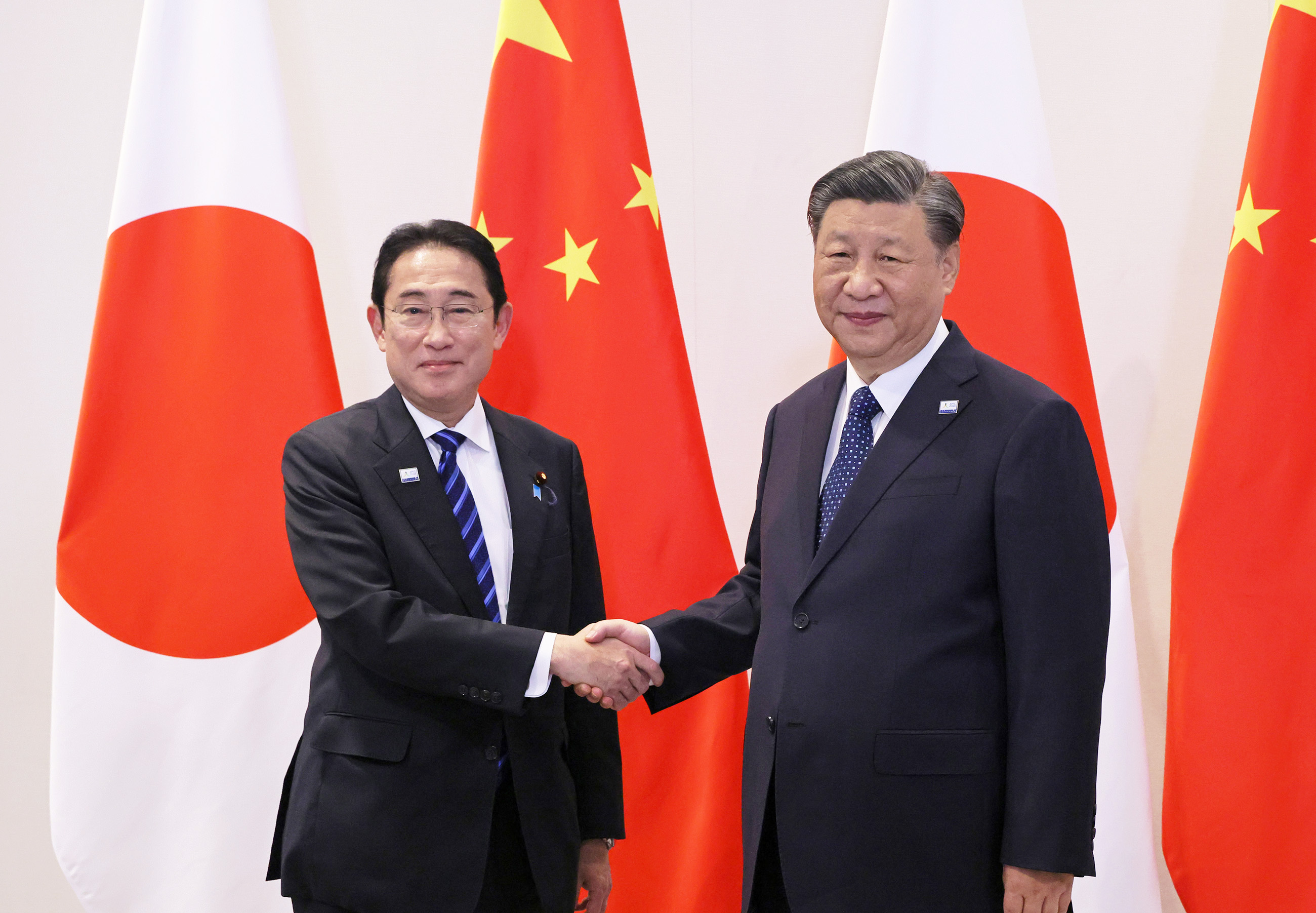Japan-China Summit Meeting (Summary)
November 16, 2023
[Provisional translation]
On November 16, commencing at 5:40 p.m. local time (10:40 a.m. on November 17 Japan time) for approximately 65 minutes through simultaneous interpretation, Mr. KISHIDA Fumio, Prime Minister of Japan, who was visiting San Francisco in the United States to attend the APEC Summit, held a Summit Meeting with Mr. Xi Jinping, President of the People’s Republic of China. The summary of the meeting is as follows.
1. Overview
Prime Minister Kishida stated that this year marks the 45th anniversary of the Treaty of Peace and Friendship between Japan and the People’s Republic of China, and that this has provided the people of both countries an opportunity to remember the efforts made by many of their predecessors for the development of friendly relations in a wide range of areas and to look ahead to the future of Japan-China relations. Prime Minister Kishida added that it is important that as major powers that lead the region and the international community, both Japan and China fulfill their responsibilities to contribute to global peace and stability.
The two leaders reaffirmed to firmly uphold the principles and common understanding of the four basic documents between Japan and China, and to comprehensively promote a “Mutually Beneficial Relationship Based on Common Strategic Interests.” The two leaders went on to confirm a broad direction of building “constructive and stable Japan-China relations” in order to carve out a new era in Japan-China relations.
From that perspective, the two leaders welcomed the successful ministerial dialogue held this year in the areas of foreign affairs; economy, trade and industry; defense; and environment, and concurred to have close communication at all levels, including the summit level, one after another.
2. Cooperation
Prime Minister Kishida expressed his desire to promote mutually beneficial cooperation in specific areas of economy and people-to-people exchanges. Prime Minister Kishida also expressed his desire to help revitalize Japan-China economic exchanges after ensuring a business environment that guarantees legitimate business activities.
The two leaders agreed to hold the Japan-China High-Level Economic Dialogue at an appropriate time in order to achieve concrete results in areas of cooperation, such as green economy, including environment and energy conservation as well as medical care, nursing care, and healthcare. The two leaders also welcomed the launch of the Japan-China Export Control Dialogue.
The two leaders also concurred to strengthen dialogue on macro-economy and confirmed that the geographical scope of Japan-China cooperation is expanding across the world. In addition, the two leaders agreed to work together as responsible major powers on global challenges such as climate change.
Furthermore, the two leaders agreed to further expand people-to-people exchanges in various areas, and to hold the Japan-China High-Level People-to-People and Cultural Exchange Dialogue at an appropriate time.
3. Issues of Concern
Prime Minister Kishida welcomed the launch of the operation in May of a hotline between the Japanese and Chinese defense authorities under the Maritime and Aerial Communication Mechanism, and stated the importance of communication on security matters. In addition, Prime Minister Kishida reiterated his serious concerns regarding the situation in the East China Sea, including the situation surrounding the Senkaku Islands, and called for the immediate removal of the buoy installed in Japan’s EEZ. He also reiterated his serious concerns regarding the intensification of China’s military activities in areas surrounding Japan, including collaboration with Russia, and other matters.
Furthermore, Prime Minister again stressed that peace and stability across the Taiwan Strait is extremely important for Japan and the international community, and stated (in response to President Xi’s remarks on China’s position on Taiwan) that Japan’s position on Taiwan is based on the Joint Communique of the Government of Japan and the Government of the People's Republic of China issued on September 29, 1972 and that there is no change in this position.
Prime Minister Kishida also reiterated his call for the early release of Japanese nationals detained in China.
Furthermore, Prime Minister Kishida once again strongly called for calm response based on scientific evidence in response to the discharge of ALPS treated water into the sea, and reiterated his call for the immediate lifting of import restrictions on Japanese food products. Recognizing that there are differences in their respective positions, both sides shared the view that they will seek to find ways to resolve issues through consultations and dialogue in a constructive manner.
4. International Affairs
The two leaders also discussed international affairs, such as North Korea, including the abductions issue, the Middle East and Ukraine. The two leaders also confirmed that they will maintain close communication on those issues.
